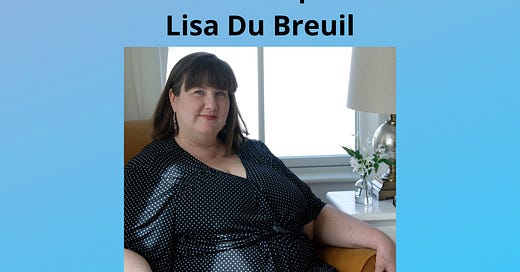Hi All,
If this post looks familiar, it’s because there was a glitch and it accidentally got sent to everyone over the weekend. I’m resending in case you missed it. Otherwise, Lisa is so nice we are reading this twice!
1. Tell us a bit about yourself and your work
Sure. It's Lisa Du Breuil and my pronouns are she, and her I'm a clinical social worker and I work in outpatient psychiatry at a large hospital working with people with both substance use disorders and eating disorders and people that have developed different issues after weight loss surgeries. And then I also have a private practice where I see people with eating disorders and body image distress and chronic dieting who are ready to get off that roller coaster and take care of themselves without pursuing weight loss.
2. How did learn about the concept of weight-neutral, body affirming care?
Wow. Way back in the olden days. I attended an eating disorders conference and there was a very interesting performance given by someone called Deb Lemire. She's my health at every size godmother because I saw her piece, she's a fat woman and, it was about accepting your body. And I was just like, wow, who is this? And I, I looked at the conference’s little handout book and I saw, what is this? Health at Every Size, what is that? And that was the beginning of it for me. I must have been in my early thirties at that time, so over 20 years ago.
3. How have you/do you apply those concepts to your work?
Everybody I see whether I'm seeing someone because they have an eating disorder or they're worried about that. Or if I'm seeing someone with whose issue is more around substance use, I approach everyone with a weight inclusive lens. So it's really about helping people figure out - how do I take good care of myself and manage my issues without and learn better self-care without focusing on weight loss. So really helping people understand what things they can change, and all the things that are social determinants of health and stigma that we can't personally doing anything about, but we can build some resilience against. Helping people take the problem away from themselves and their body and put the problem where it belongs and explaining that their body's not the problem, that they are not the problem.
So that's how I think about it. And the other way I describe it to people is, I really try and help people see their bodies as their partner. It’s like those movies where two people are handcuffed together and they don't like each other, but they have to get along. That's how I see it. Our bodies are our partners, they're part of us. And we only get one. The longest relationship you have is with your body. And so it’s about learning how to work together - you don't just have to like each other, and sometimes you might be really mad at each other, but this is who you got. So it’s learning how to see your body as your partner. Not as something that's trying to cause problems for you, but someone that's there for you every single day, and sort develop that kind of a relationship.
4. What’s one thing that you wish people who are still working from a weight-focused paradigm could learn/know?
Ok, just one thing for today. What I really wish people understood, and when I think of people I'm really thinking of white people, is that this concern about weight is not a silo. It's not this one thing that's disconnected from anything else…that this concern about weight and body size has its roots connected, to all these other oppressions - racism, homophobia, transphobia and more. They're colluding inwhite supremacist system. You can't separate it out when you really look at it and you look at where it came from and you look at the harm that it's doing. You can't really separate it from these other ways that we oppress people and tell them that their bodies are wrong. And I wish people understood that.
Editor’s note: Please read Sabrina Strings’ Fearing the Black Body – the Racial Origins of Fat Phobia and Da’Shaun Harrison’s Belly of the Beast: The Politics of Anti-Fatness as Anti-Blackness for more information about the racist origins of weight stigma.
5. How and where do we find you and your work?
My website is http://lisadubreuil.com/
My Twitter is https://twitter.com/lisajdubreuil




